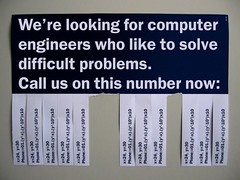Matt Asay has some good advice for folks asking him for career advice: “Work for an open source company.”
I’d wholeheartedly agree. I’d like to add “or within the open source group of a traditional software company”. (Yeah, Matt’s advice is snappier).
Here’s why I suggest the addition:
Take a look at this job posting for Director of Product Marketing at SocialText which I found on Roberto Galoppini’s blog. The only requirement which appears to be a skill that you’ll build more easily at an open source pure-play than a traditional software vendor is “Holistic understanding of commercial open source software”. If you’re in a division at IBM, Oracle or Sun that is leveraging the value of open source, you’ll get this experience. It doesn’t hurt to play with open source on evenings or weekends.
requirement which appears to be a skill that you’ll build more easily at an open source pure-play than a traditional software vendor is “Holistic understanding of commercial open source software”. If you’re in a division at IBM, Oracle or Sun that is leveraging the value of open source, you’ll get this experience. It doesn’t hurt to play with open source on evenings or weekends.
Next, the following comment from Elias Torres. Elias is an IBMer (whom I’ve never met, but know of because I use his Firefox extension) who worked on Lotus Ventura. Elias is an IBMer working on the Apache Roller open source project and on the team using Roller within Ventura (a commercial IBM product). His experience balancing the needs of the community with the needs of his employer are going to be a valuable asset for Elias I’m sure.
“This is my first IBM product experience and it has been a very positive one so far, but we can talk about that later. The experience of taking something built by the community and making it a product has been incredibly rewarding but brings with it a great sense of responsibility. We are very serious about Roller and are committed to giving back as much as we can.”
Lastly, I can speak from personal experience with trying to get a product (WAS Community Edition, aka WAS CE) based on open source technology (Apache Geronimo) out the door at IBM. Being the WAS CE product manager was the best job I’ve had at IBM. Even though IBM had a lot of experience with open source at the time, a lot of what we did with WAS CE was new territory. Using an open source business model of paid support around a free product was completely new. To say we had some internal angst from other groups at IBM would be an understatement. But the angst wasn’t because we were trying an open source business model. It was because we were doing something that wasn’t business as usual. We got through these challenges with some help from executives that gorked the value of WAS CE to the WebSphere portfolio. The many meetings to explain what we’re doing and how it fits with a given IBM product’s plans also helped. There was, and remains, plenty of day-to-day work to ensure we did/do the right things in the Geronimo community, for WAS CE customers/partners and for our broader WebSphere & IBM customers/partners. Did we make some tradeoffs to balance all three interests? Definitely. Did we usually pick the business as usual route? Nope. Did knowing the business as usual route help? Absolutely. Was it easy? Nope. Was it fun? Heck ya!
I believe that the open source business model will continue to find a home inside more and more traditional software vendors. As this occurs, folks who have experience with open source software and traditional software are going to be very valuable. Folks that can walk the delicate tightrope between the ideologies of both camps will be even more indispensable.
Yes, I know that sounds like a self serving statement :-)
<Update: 2007-01-17> Zend just got themselves a new CEO from BMC. Read the press release or this short interview Matt Asay did with the new CEO and you may notice he’s got a lot of traditional software experience, but very little open source cred. It’s not a negative. Just another reason why I believe it’s good to build your open source cred within a traditional software company. </update>
01.17.07 at 2:17 am
[…] calls “The Suits“. Ergo, it increases your market value, which proves Matt’s and Savio’s […]
03.25.09 at 12:22 pm
[…] me of a post from early 2007. I’m convinced that “go work at IBM, Microsoft, Oracle, SAP, Tibco, […]
03.27.09 at 4:09 pm
[…] Rodrigues cleaned up an old blog post retitling it after a tweet from Bob Sutor, to tell people interested in open source to not consider […]